Key takeaways:
- Empathy and active listening are crucial for understanding and addressing guests’ concerns, helping to defuse tension and create a positive experience.
- Effective guest management directly influences event success, fostering an environment where guests feel valued and engaged.
- Strategies such as clear communication, personalization, and humor can significantly enhance interactions and transform challenging situations.
- Proactive preparation, including creating FAQs and following up with guests, can prevent issues and build lasting relationships.
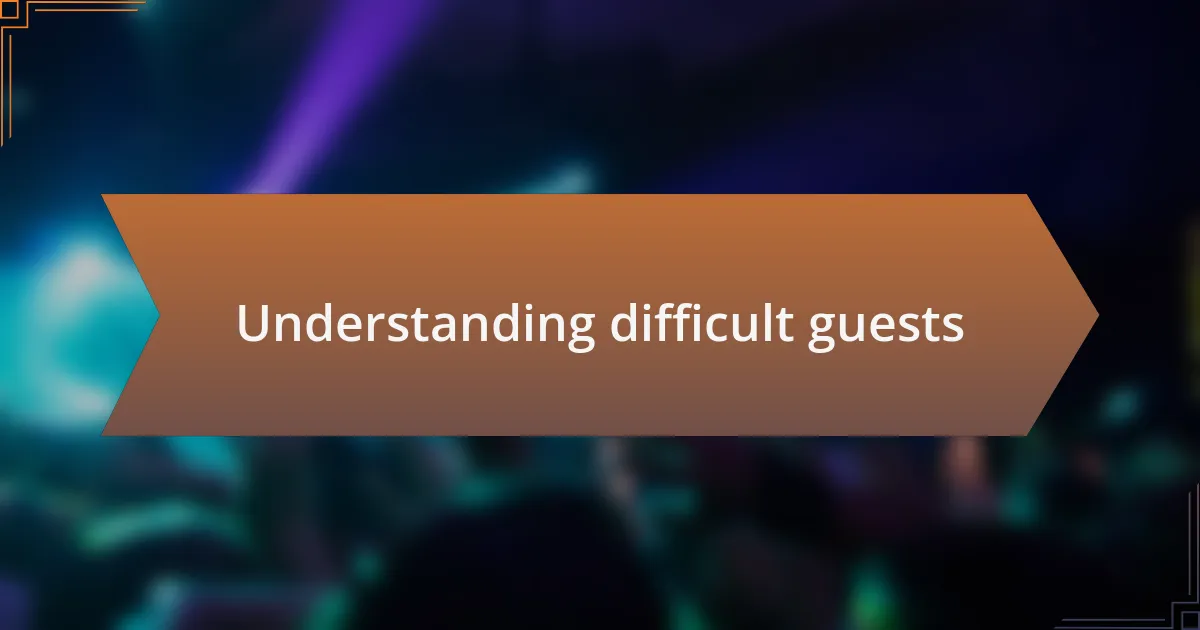
Understanding difficult guests
Understanding difficult guests can often feel like deciphering a complex puzzle. Each guest comes with their own background, expectations, and emotions, all of which can influence their behavior. I remember a time when a guest at a wedding became agitated over a seating arrangement. It struck me how a simple oversight could ignite frustration. What seemed minor to me was monumental for them, and it made me realize that empathy plays a crucial role in addressing their concerns.
Sometimes, I find that a guest’s difficulties stem from deeper issues, such as stress or personal struggles that bleed into their public interactions. Have you ever encountered someone who seemed upset without a clear reason? I once attended an event where a participant was taking out their frustrations on the staff. It was challenging, but I made an effort to listen actively, and that simple act transformed the interaction. It’s astonishing how a little attention can defuse tension and make someone feel validated.
Additionally, understanding the roots of a guest’s behavior often reveals how crucial communication is in event management. Think about it—when was the last time you felt unheard? I’ve learned that asking open-ended questions can shift the dynamic significantly. By inviting guests to share their concerns, I not only gained vital insights, but I also created an atmosphere of trust. It’s this understanding that can turn a negative experience into a positive one, which is invaluable in my role.
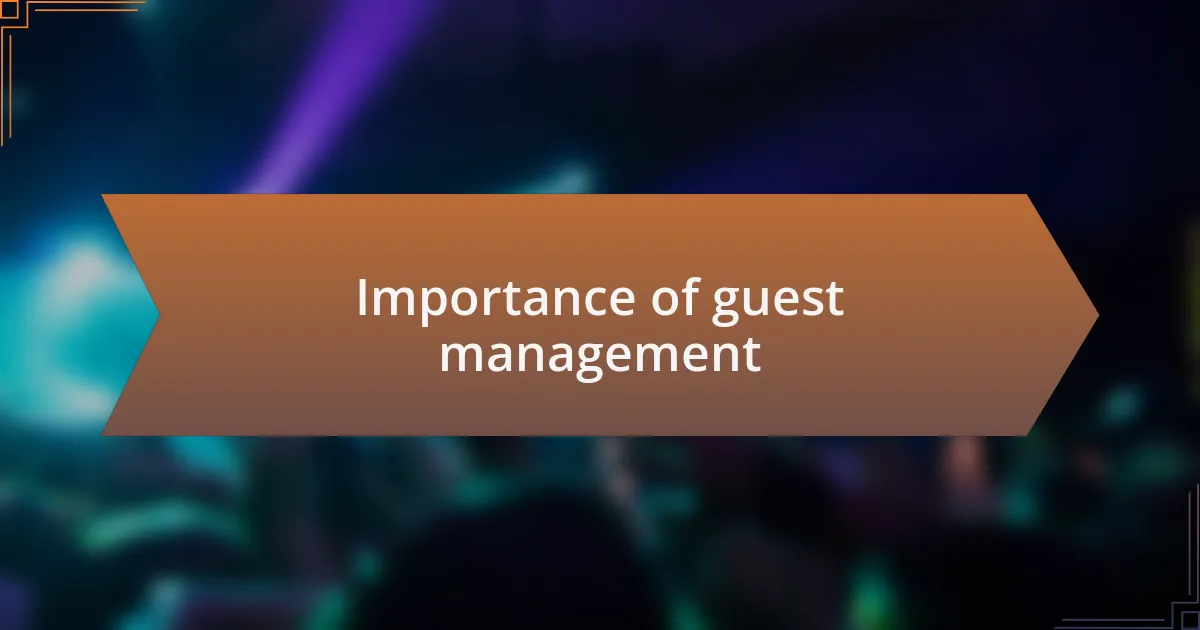
Importance of guest management
Effective guest management is essential for creating memorable experiences. I once managed a corporate event where the atmosphere shifted dramatically due to a guest’s complaint about the food. Instead of brushing it off, I took the time to discuss his preferences. This simple act not only calmed his frustration but also made him more engaged for the rest of the event.
When I think about the repercussions of poor guest management, it’s alarming. During a charity gala, I witnessed a miscommunication lead to several guests feeling neglected. Their dissatisfaction was palpable, and it impacted the overall mood of the room. This instance taught me that managing guests well isn’t just about addressing complaints; it’s about fostering an environment where everyone feels valued and respected.
Furthermore, I believe that effective guest management can directly influence the success of an event. Have you ever left somewhere feeling unwelcome or overlooked? I have, and it sticks with you. I’ve learned that by making a proactive effort to engage with each guest, their overall experience significantly improves, which can lead to positive reviews and repeat business. This connection fosters not just a pleasant atmosphere but also long-lasting relationships.
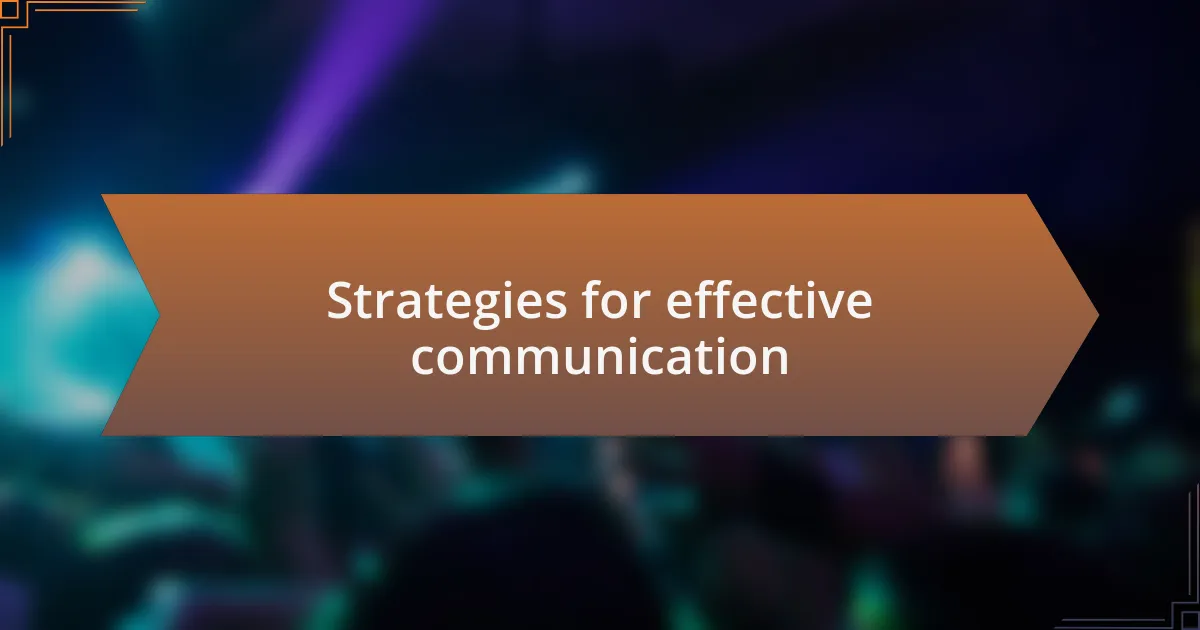
Strategies for effective communication
Effective communication starts with active listening. I remember a time when a guest expressed dissatisfaction with their seating arrangement at a wedding I coordinated. Instead of offering quick reassurances, I listened carefully to their concerns and asked questions to ensure I understood their perspective. This not only diffused their anxiety but also built trust that made the rest of our interaction smooth and respectful.
Clarity is vital when conveying information, especially in high-pressure situations. I often think back to a corporate seminar I organized where a key presenter was running late. Instead of leaving guests in the dark, I quickly communicated the delay through friendly announcements. Providing clear updates helped maintain a calm environment and reassured attendees that their time was valued, ultimately enhancing their experience.
Another strategy I appreciate is personalizing interactions whenever possible. One evening, I noticed a guest sitting alone during a cocktail hour. I approached them not just with pleasantries, but by asking about their interests. This small gesture transformed the guest’s experience; they lit up and ended up connecting with other attendees. It’s these personalized touches that remind us of the profound impact effective communication can have on your event’s atmosphere.
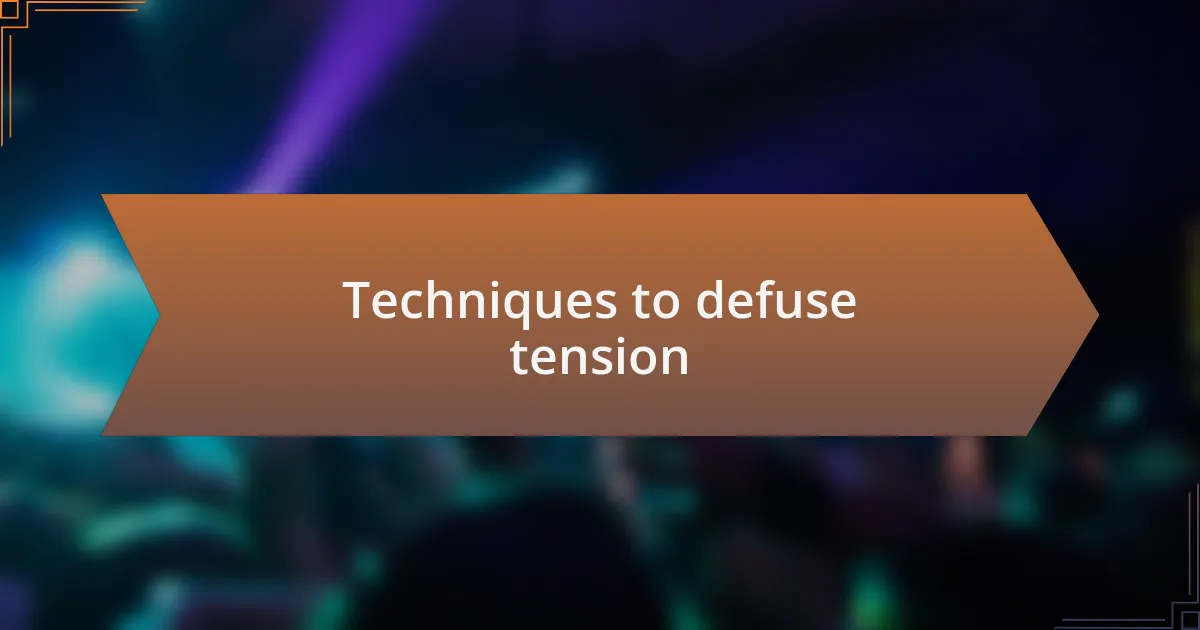
Techniques to defuse tension
Maintaining composure is essential when tensions run high. I recall an event where a guest was visibly upset about a catering issue. Instead of reacting defensively, I took a deep breath and calmly addressed their concerns. This approach helped me remain centered while validating their feelings, showing them they were heard, which often cooled tempers before they escalated.
One effective technique I find invaluable is using humor to lighten the mood, when appropriate. At a recent gala, a miscommunication resulted in a mix-up with seating arrangements that had some guests grumbling. I decided to interject a lighthearted comment about “hosting a surprise seating arrangement reveal!” With laughter, the tension eased, allowing guests to focus on enjoying the evening rather than fixating on the mishap.
Empowering guests can also work wonders in diffusing tension. I remember an instance where a guest was frustrated over a long wait for an activity. Rather than insisting they follow the schedule, I invited them to suggest alternatives or express what they would enjoy in the meantime. This not only made them feel valued but also shifted the focus towards collaboration, turning a negative experience into a positive engagement. How often do we underestimate the power of involvement in resolving conflicts?
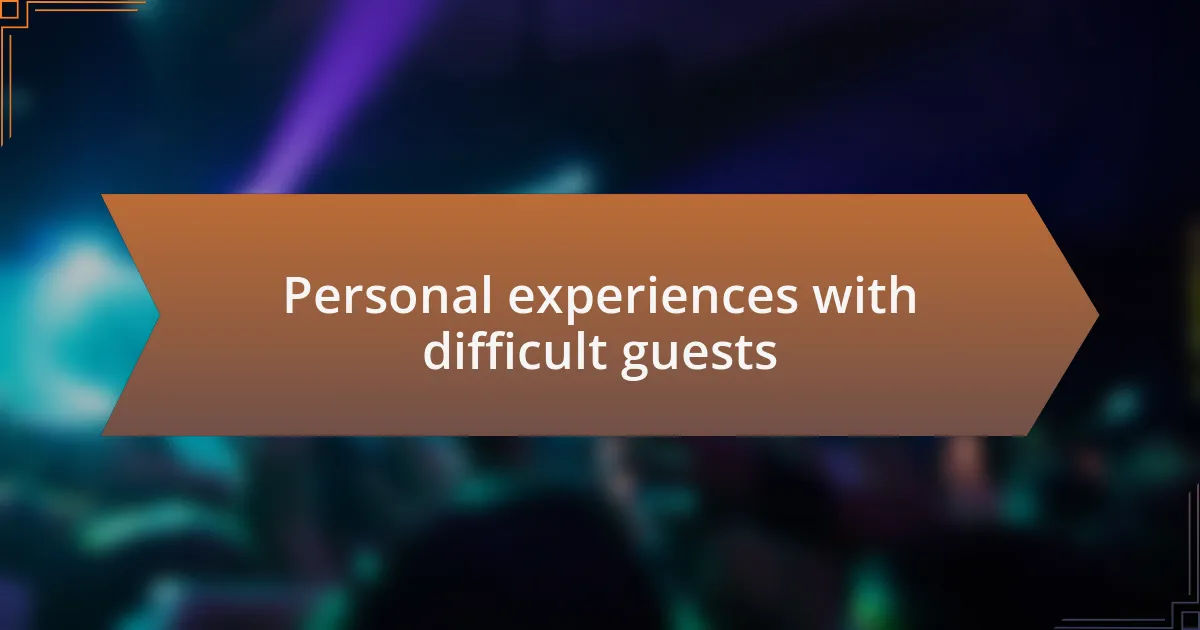
Personal experiences with difficult guests
There was a time during a wedding reception when a guest approached me, visibly upset about the music selection. Initially, I thought about defending the DJ’s choices, but then I remembered how much emotions can run high during such events. Instead of arguing, I asked how the music made them feel and what they would prefer. That simple shift in focus allowed us to have an open conversation, ultimately ending with both of us smiling as I arranged for a few requests to be played.
I think back to a corporate event where a guest was unhappy with the room temperature—it was either too hot or too cold, depending on who you asked! Rather than dismissing their concerns, I shared a relatable experience, recounting an office meeting where I had felt the same discomfort. This shared moment of empathy lightened the conversation, allowing us to explore options together, like adjusting the thermostat for everyone’s comfort. It was fascinating to see how quickly hostility faded when we connected as people rather than as an upset guest and an event manager.
One memorable incident involved a noisy group who was disrupting a quiet dinner gathering. Instead of confronting them and risking further escalations, I walked over with a smile and invited them to join a fun trivia game I had set up nearby. Their laughter and energy surged into the main area, and as they became engaged, the atmosphere shifted positively. Sometimes, simply finding common ground through shared enjoyment can transform a potentially challenging situation into a joyful experience.
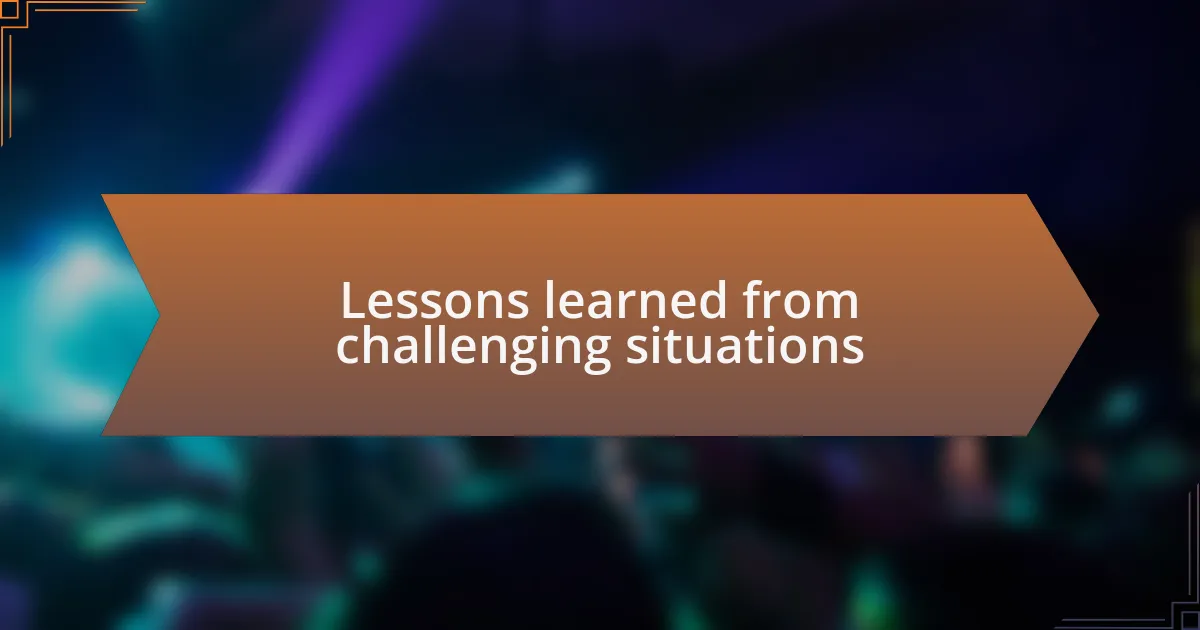
Lessons learned from challenging situations
During one particularly challenging gala, a guest confronted me about the lack of gluten-free options at dinner. Instead of getting defensive, I took a moment to empathize with their frustration. Reflecting on my own dietary restrictions, I can understand how crucial it is to feel considered at an event. By actively listening and reassuring them I would address their concerns promptly, I was able to turn their anger into appreciation, which taught me the value of empathy in diffusing tensions.
Another time, I found myself dealing with a feedback email filled with criticism about the event’s layout. At first, I felt defensive, wondering if I had overlooked important details. But after a moment of reflection, I realized that constructive criticism is an opportunity for growth. I decided to reach out to this guest directly, thanking them for their insights. This not only helped me improve future events but also created a connection with someone who felt heard and valued.
I recall an industry conference where a speaker’s mic failed right before their presentation. Panic started to rise, and I knew I had mere minutes to act. Instead of freezing, I rallied the team to reposition the speaker and quickly get a backup ready. That night, over a cup of coffee, we shared laughter about our spontaneous teamwork and adaptability. I learned that remaining calm and resourceful under pressure can turn potential chaos into a powerful example of collaboration—and that preparing for the unexpected is just as vital as planning the agenda.
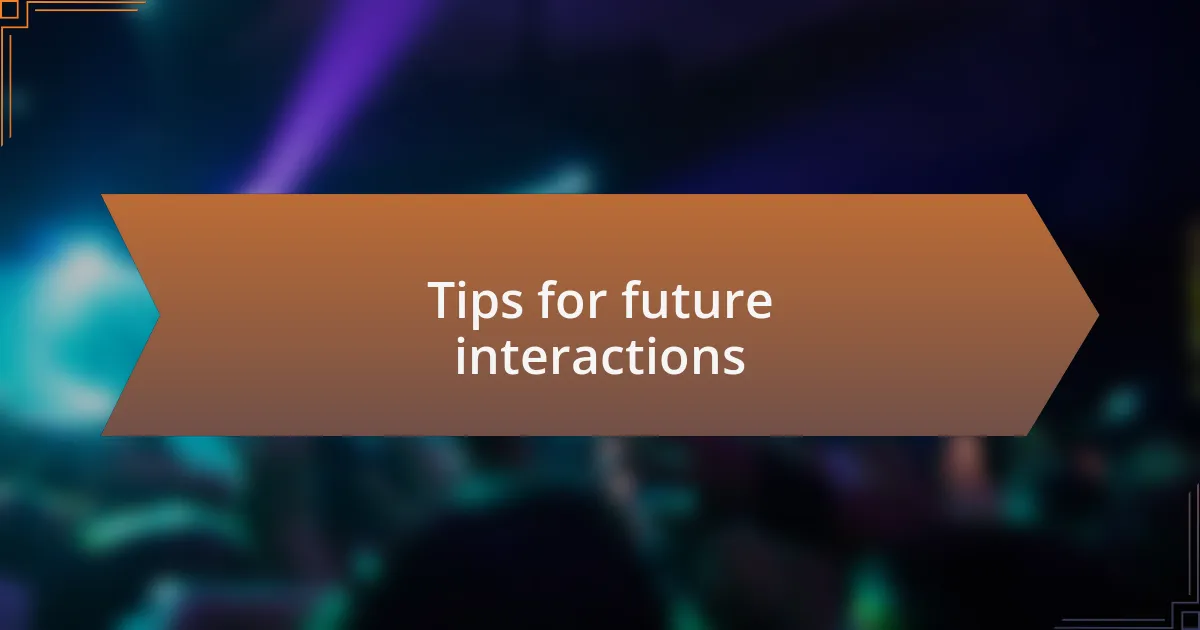
Tips for future interactions
When it comes to future interactions with difficult guests, I’ve learned that preparation is key. For instance, I now create a detailed FAQ sheet to hand out at events, addressing common concerns like dietary restrictions or seating arrangements. Have you ever had a moment when you wished you had anticipated a guest’s needs? This proactive approach not only helps manage expectations but also makes guests feel valued before they even raise an issue.
Another important tip is to practice active listening. In a recent situation, I made a conscious effort to paraphrase what a frustrated guest shared about their experience. This technique reinforced to them that I genuinely cared about their concerns. Have you considered how much it can shift a conversation when someone feels truly heard? It’s one of those small but impactful strategies that fosters stronger relationships and encourages open dialogue.
Lastly, I find it beneficial to follow up with any guests who voiced complaints after the event. I recently sent a personalized email to a guest who had previously expressed disappointment, thanking them for their feedback and sharing improvements implemented due to their input. This not only demonstrated my commitment to growth but also turned a potentially negative experience into a positive reinforcement. How powerful is it to turn criticism into loyalty? Engaging in this way can transform your event’s reputation and create lasting connections.